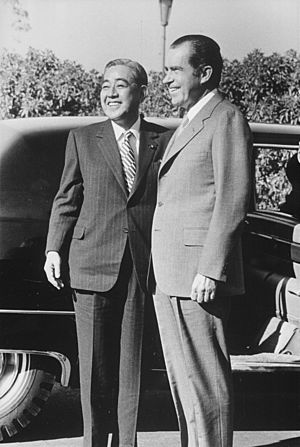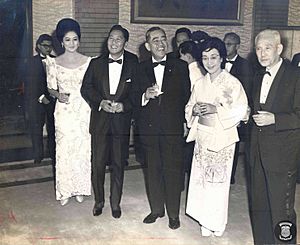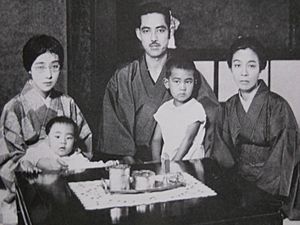Eisaku Satō facts for kids
Quick facts for kids
Eisaku Satō
Junior First Rank
SMN DUT |
|||||
|---|---|---|---|---|---|
|
佐藤 栄作
|
|||||
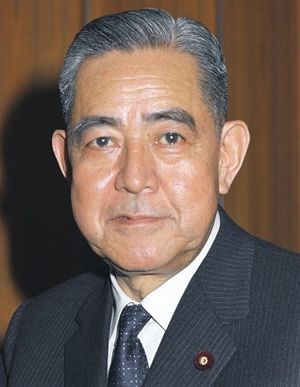 |
|||||
| Prime Minister of Japan | |||||
| In office 9 November 1964 – 7 July 1972 |
|||||
| Monarch | Shōwa | ||||
| Preceded by | Hayato Ikeda | ||||
| Succeeded by | Kakuei Tanaka | ||||
| Member of the House of Representatives | |||||
| In office 23 January 1949 – 3 June 1975 |
|||||
| Constituency | Yamaguchi 2nd | ||||
| Personal details | |||||
| Born | 27 March 1901 Tabuse, Yamaguchi, Empire of Japan |
||||
| Died | 3 June 1975 (aged 74) Tokyo, Japan |
||||
| Political party | Liberal Democratic Party (1955–1975) | ||||
| Other political affiliations |
Liberal Party (1949–1955) | ||||
| Spouse |
Hiroko Satō
(m. 1926) |
||||
| Children | 2, including Shinji | ||||
| Relatives | Nobusuke Kishi (brother) Shinzo Abe (grandnephew) Nobuo Kishi (grandnephew) |
||||
| Alma mater | Tokyo Imperial University | ||||
| Signature |  |
||||
| Japanese name | |||||
| Shinjitai | 佐藤栄作 | ||||
| Kyūjitai | 佐藤榮作 | ||||
| Kana | さとう えいさく | ||||
|
|||||
Eisaku Satō (佐藤 栄作, Satō Eisaku, 27 March 1901 – 3 June 1975) was a Japanese politician. He served as the Prime Minister from 1964 to 1972. He is known for being the third-longest serving Prime Minister in Japan's history. He also holds the record for the second-longest time serving without interruption.
Satō became a member of the National Diet (Japan's parliament) in 1949. He was part of the Liberal Party. He slowly moved up in Japanese politics. He held many important jobs in the government. In 1964, he became Prime Minister after Hayato Ikeda stepped down. He was the first Prime Minister born in the 20th century.
As Prime Minister, Satō led Japan during a time of fast economic growth. He helped arrange for Okinawa to be returned to Japan. The United States had controlled Okinawa since the end of World War II. Satō also helped Japan join the Nuclear Non-Proliferation Treaty. Because of this, he received the Nobel Peace Prize in 1974.
Contents
Early Life and Career
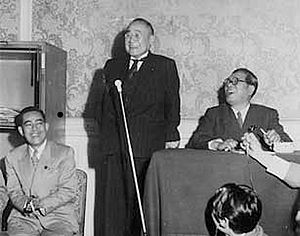
Eisaku Satō was born on March 27, 1901, in Tabuse, Yamaguchi. He was the third son of Hidesuke Satō and Moyo. His family had a long history in the sake brewing business. Many important leaders in Japan came from Yamaguchi Prefecture, where he was born. His older brother, Nobusuke Kishi, also became a Prime Minister of Japan.
Satō studied German law at Tokyo Imperial University. In 1923, he passed important government exams. After graduating in 1924, he became a civil servant in the Ministry of Railways. He worked as Director of the Osaka Railways Bureau from 1944 to 1946. He then became Vice-Minister for Transport from 1947 to 1948.
In 1949, Satō began his political career in the Diet. He was a member of the Liberal Party. He served as Minister of Postal Services and Telecommunications from 1951 to 1952. He also worked as chief cabinet secretary for Prime Minister Shigeru Yoshida from 1953 to 1954. Later, he was the Minister of Construction from 1952 to 1953.
The Liberal Party later joined with another party to form the Liberal Democratic Party. Satō became chairman of the party's executive council from 1957 to 1958. He then served as Minister of Finance from 1958 to 1960. This was during the time his brother, Nobusuke Kishi, was Prime Minister.
Satō also held positions in the government of Prime Minister Hayato Ikeda. He was Minister of International Trade and Industry from 1961 to 1962. From 1963 to 1964, he led the Hokkaidō Development Agency and the Science and Technology Agency.
Prime Minister of Japan
Eisaku Satō became Prime Minister after Hayato Ikeda resigned due to health issues. His time as Prime Minister was quite long. By the late 1960s, he had strong control over the Japanese government. He was popular because Japan's economy was growing quickly.
During his time, there were many student protests. These protests led to large riots. This caused the famous University of Tokyo to close for a year in 1969.
After serving three terms, Satō decided not to run for a fourth. His chosen successor, Takeo Fukuda, had his support. However, Kakuei Tanaka won the election, ending Satō's group's power.
Japan's Relations with Other Countries
Satō was the last Prime Minister of Japan to visit Taiwan while in office. In 1965, he approved a large loan to Taiwan. He visited Taipei in September 1967. In 1969, Satō said that protecting Taiwan was important for Japan's safety.
Satō generally followed the United States on many big issues. However, he was against the Nixon visit to China. He also strongly opposed China joining the United Nations in 1971.
Nuclear Policy
In the 1960s, Satō believed Japan might need nuclear weapons. However, the United States did not agree. The US government encouraged Japan to sign the Nuclear Non-Proliferation Treaty. This treaty aimed to stop the spread of nuclear weapons.
Satō introduced the Three Non-Nuclear Principles on December 11, 1967. These principles state that Japan will not make, own, or allow nuclear weapons on its soil. Japan officially adopted these principles in 1971. For his work on this, Satō received the Nobel Peace Prize in 1974.
Later information showed that Satō was more open to the US keeping nuclear weapons in Japan. Documents released in 2008 showed that in 1965, he discussed using nuclear weapons against China with US officials. In 2009, his son said that Satō agreed in 1969 to let the US keep nuclear warheads in Okinawa once it was returned to Japan.
Okinawa's Return to Japan
After World War II, Okinawa was controlled by the United States. In January 1965, Satō asked US President Lyndon Johnson to return Okinawa to Japan. In August 1965, Satō became the first Japanese Prime Minister after the war to visit Okinawa.
In 1969, Satō made a deal with US President Richard Nixon. This deal brought Okinawa back to Japan and removed its nuclear weapons. However, it also allowed US forces to keep military bases in Okinawa. Okinawa officially returned to Japan on May 15, 1972. This also included the Senkaku Islands.
Relations with Southeast Asia
During Satō's time, Japan helped create the Asian Development Bank in 1966. Japan also hosted a meeting about economic growth in Southeast Asia. This was the first international meeting sponsored by the Japanese government after the war. In 1967, he was the first Japanese Prime Minister to visit Singapore.
Later Life and Death
Satō shared the Nobel Peace Prize with Seán MacBride in 1974. He received the award for showing the Japanese people's desire for peace. He was also honored for signing the Nuclear Non-Proliferation Treaty in 1970. He was the first person from Asia to accept the Nobel Peace Prize.
On May 19, 1975, Satō suffered a severe stroke at a restaurant. He fell into a coma. He passed away on June 3, 1975, at the age of 74. After a public funeral, his ashes were buried in his family's cemetery in Tabuse.
After his death, Satō received the Collar of the Order of the Chrysanthemum. This is the highest honor in Japan.
Personal Life
Eisaku Satō married Hiroko Matsuoka in 1926. They had two sons, Ryūtarō and Shinji. Hiroko's father was Eisaku's uncle. Their son Shinji followed his father into politics. He served in both houses of parliament and as a government minister. Shinji's son-in-law, Masashi Adachi, is also a politician.
Satō enjoyed playing golf, fishing, and practicing the Japanese tea ceremony. His older brother, Nobusuke Kishi, and his grandnephew, Shinzō Abe, also became Prime Ministers of Japan.
Honours
Satō received many awards and honors:
- Golden Pheasant Award of the Scout Association of Japan (1970)
- Grand Cordon of the Order of the Chrysanthemum (November 3, 1972)
- Nobel Peace Prize (May 12, 1974)
- Collar of the Order of the Chrysanthemum (June 3, 1975; given after his death)
- Junior First Rank (June 3, 1975)
Foreign Honours
 Spain: Knight Grand Cross of the Order of Isabella the Catholic (February 23, 1965)
Spain: Knight Grand Cross of the Order of Isabella the Catholic (February 23, 1965) Malaysia: Honorary Grand Commander of the Order of the Defender of the Realm (S.M.N.) (1967)
Malaysia: Honorary Grand Commander of the Order of the Defender of the Realm (S.M.N.) (1967) Singapore: The Order of Temasek (September 25, 1967)
Singapore: The Order of Temasek (September 25, 1967) Mexico: Sash of the Order of the Aztec Eagle (March 9, 1972)
Mexico: Sash of the Order of the Aztec Eagle (March 9, 1972) Paraguay: Grand Cross of National Order of Merit (April 5, 1972)
Paraguay: Grand Cross of National Order of Merit (April 5, 1972) South Korea: Order of Diplomatic Service Merit (1969)
South Korea: Order of Diplomatic Service Merit (1969) Laos: Order of the Million Elephants and the White Parasol (1966)
Laos: Order of the Million Elephants and the White Parasol (1966)
See also
 In Spanish: Eisaku Satō para niños
In Spanish: Eisaku Satō para niños
- List of Japanese Nobel laureates
- List of Nobel laureates affiliated with the University of Tokyo
 | Charles R. Drew |
 | Benjamin Banneker |
 | Jane C. Wright |
 | Roger Arliner Young |


